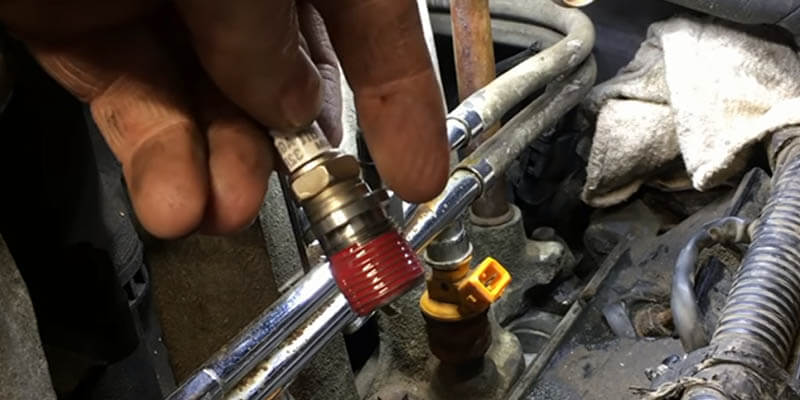One of the common issues that a driver faces during driving is the spark plug disintegration or you can say the burst out. This is a worrying case and has to be taken seriously. Many people still keep driving with a blown-out spark plug, but is it wise? No!
Things can go from bad to worse in seconds. For example, if the spark plug has an ignition coil on top of it and it fires up unwantedly, you might hear a deafening blown spark plug sound. So what would cause a spark plug to blow out?
We are here to talk about the potential causes and fixes in the following article.
What Is a Spark Plug And What Is the Use of It
Just having the key to your ignition won’t start up the car or you. There has to be fully working spark plugs placed in the engine to make it run. As you might know, a car engine works due to the combustion of fuel and air and it plays a crucial role in the speedy start.
To make the combustion work, you first gotta give an initial spark to start up the reaction, this is where a spark plug works wonder. It is an electrical component that fits on cylinder heads and produces the much-needed electrical jolt to start the combustion process.
It is advised that every car owner must look for their car manufacturer’s recommendation regarding spark plug installation and replacement criteria. This intricate piece of mechanism ensures functional pistons and a smooth driving experience.
What Causes a Spark Plug to Blow Out of An Engine
There is no one particular problem but rather there are a few different things that could go wrong with a spark plug. One reason can be that the plug is too overpowering in terms of strength compared to the cylinder head.
Spark plugs are made to last extreme temperatures and withstand different hazards, but what is aligned with it also needs to match the power and capacity.
For example, aluminum cylinder heads are more prone to falling in comparison to cast iron ones. In simpler words, you might notice a spark plug blowing out of your head. There are many other complications such as.
1. Manufactured With A Flaw
This is a rare case where you end up with a flawed plug, this is because automobile component manufacturers test their products before dispatching them. That being said, you may still get a defective product from spark plug manufacturers.
There have been some complaints from riders around the world, stating that the spark plug blew out of the engine after some use.
This could be because of the design flaw of the plug and nothing to do with the cylinder head. Aluminum spark plug threads are vulnerable to breaking compared to cast iron or copper materials.
2. Small Threaded Plugs
This falls within company defects, to be honest. You are not making the plugs and you might be aware of it before it’s too late. Shortened threads on spark plugs during the construction process can be a menace. It is a slow burn for such items.
What it does is, the heat generated within the cylinder deforms the threads quicker than a standard threaded plug. If made short, a spark plug can take on heat beyond its recovery and blow out due to lack of threading.
3. Cylinder Block With Damaged Threads
Like a spark plug can have a smaller threading system, the cylinder block can also be blamed for its imperfection. The place where the spark plug goes in has thread patches to embrace the plugs.
If the threads within the holder are impaired, how can you expect a spark plug to sit there without blowing out? The heat generated from the combustion process usually deteriorates the cylinder block if it is not made with top of the line materials.
When put inside a socket that is already wearing out, spark plugs will not function as they should and you will already start to see some jerking spark plug blowout symptoms.
4. Cross Threading
This is a crucial cause of many types of mechanical failures. When a male fastener fails to match with a female fastener still people try to put them together. This is when cross-threading occurs.
It is a common cause for blown-out spark plugs in an engine. For example, you have a spark plug that doesn’t go with the threading of the cylinder block, yet you keep trying to patch it in, then there could be internal issues such as crooked or broken holes.
If not dealt with precision, you are leaving it for a potential catastrophe. Cross threading is known as a human error shaking hands with mismatched plugs and sockets.
You can overcome this by using bare hands rather than using gears that will put on an extra force that can tear up the internal threading when the match is not perfect. Using hands can let you sense minor breaks and defects.
5. Keeping Loose Ends
Not tightening the plug to its optimum limit is the most recurring reason for a spark plug blowout. You’ve seen it right, just a minor loose end on the tightening can make the spark plug go boom.
A solution to it is to retorque the engine blocks regularly if the problem keeps arising over and over again. When you circle the patch and unwantedly keep it loose, it can make the plug deform easily.
The excessive movement stresses out the threading and takes a toll on the plug’s body, thus it tends to go dead.
How Would You Monitor A Blown-Out Spark Plug
Whenever a spark plug gets impaired, it is pretty visible to the driver. If you are someone who still finds it difficult to figure out whether the plug is alright or not, then you better look at the five basic symptoms mentioned in this section.
If you observe any of the signs, you better get it checked or replaced ASAP.
1. Engine Misfiring
It is easy to observe an engine speed slowing down and peaking up. If this is the case in your vehicle, then you need it checked. Misfires occur mostly because of inadequate spark plugs on the slot.
The misfired engine will hamper the catalytic converter and emit gasoline on the surface, due to leakage. A strong smell can be a cue to figure out potential damage.
2. Abnormal Fuel Consumption
When a spark plug goes off, the engine starts to overwork itself to keep it functioning. This affects the fuel burning rate and you will observe that your car is needing more fuel than ever.
A worn-out spark plug straight up hampers the combustion chamber and the reaction takes a toll on the fuel consumption.
The chamber stops working efficiently and you will have to refill the fuel too early than regular use. If you have encountered this, your car needs a checkup.
3. Engine Signal Lights
Most new model cars have an upper edge to let you know if there are any issues with the engine. For example, if the signal light beeps or pops up, it is a sign that the engine is facing some mishaps.
Once you see the lights signaling you, you should take action immediately and have it repaired before it’s too late and damages the engine permanently. Lights such as this can indicate spark plug problems so we advise you to keep your eyes open.
4. Irregular Acceleration
A simple way to mark spark plug blow-out problems is to put your foot on the accelerating pedal. If the car speed is not going up and has stutter issues, then it is a straight indication of blown spark plugs.
Spark plug damage will curb the reaction in the carburetor and won’t pick up the speed like it used to. When you face such a problem, you should know that the plug is not potent enough to ignite the combustion chamber properly.
5. Engine Noise
Last but not the least, engine rattling sounds or banging noises can be a pointer that the spark plugs need to be replaced. Loud sounds from the engine can be heard while you drive if one or more spark plugs are damaged.
If this is the case for you, go get the plugs replaced without delay.
FAQ
The fixing expense can range from 500 dollars to 1000 dollars depending on the type of your can and the parts to deal with. It will also depend on the mechanic’s service charge, so the value can even surpass or be lower than the limit we stated.
In general, a car can still run on a dead spark plug, but it is extremely dangerous to keep going with it. Once you detect any trouble with the engine, we advise you to have it repaired and not overstress the engines by driving in such a damned situation.
The best way to go about it is to install the spark plugs properly. Follow the guidance recommended by your car manufacturer or let a professional mechanic deal with it. In terms of replacement, always use compatible plugs with matching sizes to fit the cylinder head. Avoid cross-threading, which can lead to blowouts.
Conclusion
No matter what car you own or what engine it has, there can be times when your vehicle comes to a dead stop or simply starts making unpleasant noises and brings about inconsistent performance altogether.
This can be due to spark plug blowouts. Now a question might arise like, cause a spark plug to blow out? There could be many reasons and we have discussed every bit of it in this writeup.
Give it a read. From the cause to its symptoms to find a solution. The next time you face engine complexity you can determine whether it’s a blowout or not.


